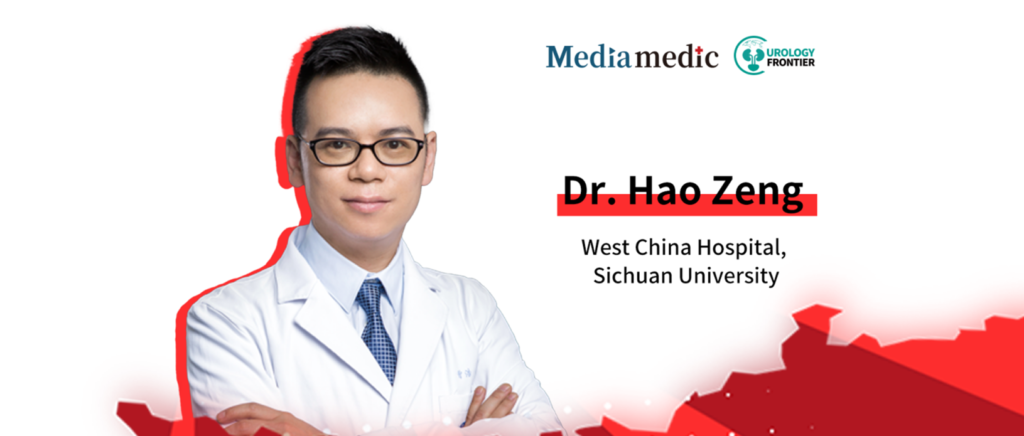
Editor's Note: Focusing on global progress while highlighting Chinese innovations, the 8th West China Uro-Oncology Tianfu Academic Conference and the 10th Uro-Oncology Annual Meeting of the Sichuan Anti-Cancer Association were successfully held in Chengdu, Sichuan. Organized by the Sichuan Anti-Cancer Association and hosted by its Urological and Male Reproductive Tumors Committee in collaboration with the Department of Urology at West China Hospital, Sichuan University, the conference brought together experts to discuss the latest advancements. Following the event, Urology Frontier had the privilege of interviewing the conference’s executive chair, Dr. Hao Zeng, to explore the highlights of the meeting and the key areas for enhancing diagnostic and treatment capabilities for grassroots physicians in uro-oncology.Urology Frontier:This year’s conference featured a wide range of topics. What do you consider the key highlights that deserve special attention?
Dr. Hao Zeng:The 8th West China Uro-Oncology Tianfu Academic Conference continues our tradition of being held on the first or second weekend of November every year. Since its inception, the conference has adhered to a multidisciplinary approach, bringing together experts from various specialties within uro-oncology to ensure both depth and breadth of knowledge exchange.
Focus on Global Frontiers
A standout feature of the conference is the dedicated session spotlighting the latest developments from international conferences. Renowned scholars delivered presentations on cutting-edge topics, offering timely and forward-looking insights into the field of uro-oncology. This session provides attendees with an efficient platform to review global advancements, enabling them to grasp the latest trends and integrate them into their clinical practice.
Showcasing Multidisciplinary Team (MDT) Expertise
One of the conference’s most compelling highlights was the exchange of real-world experiences from multidisciplinary treatment teams. Elite members from MDTs—spanning urology, oncology, radiotherapy, imaging, and pathology—shared case studies, problem-solving approaches, and treatment strategies. Through this, participants gained firsthand insights into the practical application of MDT models and observed how top-tier teams tackle complex cases with innovative diagnostic and therapeutic strategies. This interaction not only fostered cross-disciplinary collaboration but also broadened the perspectives of urologists, equipping them with the knowledge to stay abreast of emerging trends and treatment protocols in uro-oncology.
Updates on Uro-Oncology Research
Another key focus was the presentation of foundational research findings on the three major types of urological cancers. With the rapid pace of advancements in tumor therapy, almost daily updates emerge in the field. We aim to ensure that urologists, particularly surgeons, can stay informed about both clinical and research developments. By delving into the journey from drug development to clinical application, we strive to position diagnostic and treatment strategies at the forefront, ensuring that innovative therapies can benefit patients more effectively.
In summary, these three areas—global insights, MDT case sharing, and research updates—are the cornerstone of this year’s conference. They not only facilitate knowledge exchange but also provide robust support for academic progress and clinical innovation in uro-oncology.
Urology Frontier:As Chair of the Uro-Oncology Committee under the Sichuan Precision Oncology Association, what are your suggestions for improving diagnostic and treatment capabilities among grassroots physicians, ensuring cutting-edge knowledge and technology reach patients in lower-tier hospitals?
Dr. Hao Zeng:Achieving precision medicine involves both conceptual innovation and overcoming technical challenges.
Revolutionizing Treatment Philosophy
Conceptually, grassroots physicians can gain exposure to advanced diagnostic and treatment paradigms through participation in high-level academic conferences, reviewing the latest literature, and engaging in international exchanges. However, the key challenge lies in translating these ideas into actionable and accessible treatment strategies, which can be particularly difficult in grassroots settings.
To address this, we advocate for the implementation of tiered diagnostic and treatment systems as well as MDT models. For complex cases requiring advanced diagnostic methods or treatments, grassroots hospitals can perform preliminary evaluations and then refer patients to higher-level centers or MDT teams for specialized care. Patients can then return to grassroots hospitals for treatment based on the established plan, with regular follow-ups at the higher-level institutions to ensure the strategy’s efficacy and appropriateness.
Overcoming Technical Barriers
Technologically, precision medicine often depends on high-end diagnostic tools like genomic testing platforms. Grassroots hospitals typically lack such equipment, and even larger institutions in China often rely on third-party companies for these services. Establishing unified standards for genomic testing and quality control is therefore essential to ensure the accuracy and consistency of results. Standardized protocols could enable different medical institutions or regions to perform these tests collaboratively, paving the way for broader implementation of precision medicine.
Fostering Standardized Treatment
Ultimately, advancing precision medicine requires both conceptual and practical optimization, necessitating cross-departmental and cross-institutional collaboration. It’s worth noting that precision medicine should be built on a solid foundation of standardized and normalized treatment protocols. For grassroots hospitals, the immediate priority is to promote standardized care in fields like uro-oncology, with precision medicine serving as a complementary tool for further improving patient outcomes. By first addressing the need for consistent and standardized care, we can gradually introduce precision medicine to achieve even better results.
About Dr. Hao Zeng
- Secretary, Department of Urology, West China Hospital, Sichuan University
- Professor and PhD Supervisor, West China Hospital, Sichuan University
- Member and Secretary General, Young Committee of the Urological Society, Chinese Medical Association
- Member, Oncology Group of the Urological Society, Chinese Medical Association
- Member, Youth Committee of the Urological and Male Reproductive Tumor Specialty Committee, Chinese Anti-Cancer Association
- Vice Secretary-General and Deputy Chair of the Youth Committee, Urological Health Promotion Division, China International Exchange and Promotion Association for Medical and Healthcare
- Member, Expert Committees for Prostate Cancer, Urothelial Cancer, and Renal Cancer, CSCO
- Standing Member, Sichuan Urology Committee
- Deputy Chair, Oncology Group, Sichuan Urology Committee
- Chair, Uro-Oncology Committee, Sichuan Precision Oncology Association
- Vice Chair, Urological and Male Reproductive Tumor Committee, Sichuan Anti-Cancer Association


